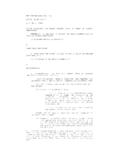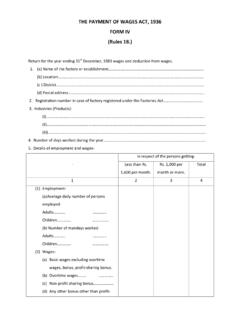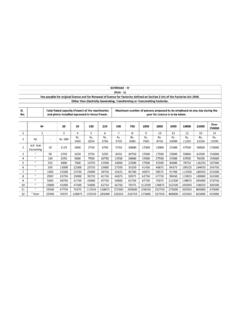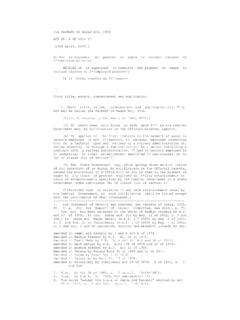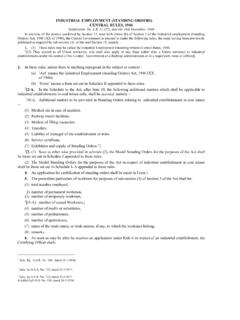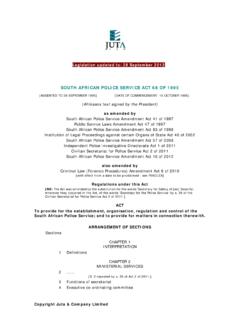Transcription of Industrial Employment Standing Orders Act, 1946 - …
1 CONTENTS. Industrial Employment ( Standing Orders ) Act, 1946. Sections Preamble 1. Short title, extent and application 2. Interpretation 3. Submission of draft Standing Orders 4. Conditions for certification of Standing Orders 5. Certification of Standing Orders 6. Appeals 7. Date of operation of Standing Orders 8. Register of Standing Orders 9. Posting of Standing Orders 10. Duration and modification of Standing Orders 10-A. Payment of subsistence allowance 11. Certifying Officers and appellate authorities to have power of Civil Court 12. Oral evidence in contradiction of Standing Orders not admissible 12-A. Temporary application of model Standing Orders 13. Penalties and procedure 13-A. Interpretation, etc., of Standing Orders 13-B. Act not to apply to certain Industrial establishments 14. Power to exempt 14-A. Delegation of powers 15.
2 Power to make rules THE SCHEDULE. Industrial Employment ( Standing Orders ). Act, 1946. 1. [Act No. 20 of 1946 As Amended by Acts Nos. 3 of 1951, 36 of 1956, 3. 16 of 1961, 39 or 19632, 51 of 1970 and 18 of 1982 ]. [23rd April, 1946]. 4. An Ac t require employers in Industrial establishments formally to define conditions of Employment under them Whereas it is expedient to require employers in Industrial establishments to define with sufficient precision the conditions of Employment under them and to make the said conditions known to workmen employed by them. It is hereby enacted as follow : 1. Short title, extent and (1) This act may be called the Industrial Employment ( Standing Orders ) Act, 1946. (2) It extends to5[the whole of India 6[* * *].]. 7. [(3) It applies to every Industrial establishment wherein one hundred or more workmen are employed, or were employed on any day of the preceding twelve months: Provided that the appropriate Government may, after giving not less than two months' notice of its intention so to do, by notification in the Official Gazette, apply the provisions of this Act to any Industrial establishment employing such number of number of persons less than one hundred as may be specified in the notification : 8.]
3 [* * * *]. 9. [ (4) Nothing in this Act shall apply to- 1. For Statement of Objects and Reasons, see Gaz., of India, 1946, Pt. V, pp. 179 & 180. 2. Came into force 23-12-1963, vide Noti. No. , 3594 dt. 23-12-1963. 3. Came into force vide Noti. No. 326 (E) dated 17-5-1982 (1982. CCL-III-146). 4. History of the The Act has been amended by the Indian Independence (Adaptation of Central Acts and Ordinances ) order , 1943; The 1950; Act 3 of 1951; Act 36 of 1956; Act 16 of 1961; Act 39 of 1963; 51 of 1970 and 18 of 1982, Object of the That the object of the Act is to have uniform Standing Orders providing for the matters enumerated in the Schedule to the Act, that it was not intended that there should be different conditions of service for those who are employed before and those employed after the Standing Orders came into force and finally, once the Standing Orders come into the force, they bind all those presently in the Employment of the concerned establishment as well as those who are appointed thereafter.]
4 Agra Electric Supply Co. Ltd. v. Aladdin, (1969) 2 SCC 598; Electric Supply Co. Ltd. v. Their Workman, (1972) 2 SEC 54. 5. Subs. by the 1950, for all the Provinces of India . 6. Omitted by Act No. 51 of 1970. 7. Subs. by Act No. 16 of 1961, S. 2 for sub-section (3). 8. The 2nd proviso to sub-section (3) omitted by Act No. 39 of 1963. 1. (i) any industry to which the provisions of Chapter VII of the Bombay Industrial Relations Act, 1946, apply; or (ii) any Industrial establishment to which the provisions of the Madhya Pradesh Industrial Employment ( Standing Orders ) Act, 1961 apply : Provided that notwithstanding anything contained in the Madhya Pradesh Industrial Employment ( Standing Orders ) Act, 1961, the provisions of this Act shall apply to all Industrial establishments under the control of the Central Government .]. 2. In this Act, unless there is anything repugnant in the subject or context 10.
5 [(a) appellate authority means an authority appointed by the appropriate Government by notification in the Official Gazette to exercise in such area as may be specified in the notification the functions of an appellate authority under this Act : Provided that in relation to an appeal pending before an Industrial Court or other authority immediately before the commencement of the Industrial Employment ( Standing Orders ) Amendment Act, 1963, that Court or authority shall be deemed to be the appellate authority:]. (b) appropriate Government means in respect of Industrial establishments under the control of the Central Government or a 11[Railway administration] or in a major Port, mine or oil field, the Central Government, and in all other in all other cases the State Government : 12. [Provided that where question arises as to whether any Industrial establishment is under the control of the Central Industrial establishment is under the control of the Central Government that Government may, either on a reference made to it by the employer or the workman or a trade union or other representative body of the workmen, or on its own motion and after giving the parties an opportunity of being heard, decide the question and such decision shall be final and binding on the parties :].
6 13. [ (c) Certifying Officer means a Labour Commissioner or a Regional Labour Commissioner, and includes any other officer appointed by the appropriate Government, by notification in the Official Gazette, to perform all or any of the functions of a Certifying Officer under this Act:]. (d) employer means the owner of an Industrial establishment to which this Act for the time being applies, and includes- 9. Added by ibid 10. Subs. by Act No. 39 of 1963. 11. Subs. by the 1950, for Federal railway . 12. Ins. by Act No. 18 of 1982 ( 17-5-1982. 13. Subs. by Act No. 16 of 1961, S. 3, for cl. (c). 2. (i) in a factory, any person named under 14[clause (f) of sub-section (1) of Section 7 of the Factories Act,1948], as manager of the factory;. (ii) in any Industrial establishment under the control of any department of any Government in India, the authority appointed by such Government in this behalf, or where no authority is so appointed, the head of the department.)
7 (iii) in any other Industrial establishment, any person responsible to the owner for the supervision and control of the Industrial establishment;. (e) Industrial establishment means (i) an Industrial establishment as defined in clause (ii) of Section 2 of the Payment of Wages Act, 1936, or 15. [(ii) a factory as defined in clause (m) of Section 2 of the Factories Act, 1948, or ]. (iii) a railway as defined in clause (4) of Section 2 of the Indian Railway Act, 1890, or (iv) the establishment of a person who, for the purpose of fulfilling a contract with the owner of any Industrial establishment, employs workmen;. (f) prescribed' means prescribed by rules made by the appropriate Government under this Act ;. (g) Standing Orders means rules relating to matters set out in the Schedule: (h) trade union means a trade union for the time being registered under the Indian Trade Union Act, 1926.
8 16. [(i) wages and workman have the meanings respectively assigned to them in clauses (rr) and (s) of Section 2 of the Industrial Disputes Act, 1947 (14 of 1947).]. 3. Submission of draft Standing (1) Within six months from the date on which this Act becomes applicable to an Industrial establishment, the employer shall submit to the Certifying Officer five copies of the draft Standing Orders proposed by him for adoption in this Industrial establishment. (2) Provision shall be made in such draft for every matter set out in the Schedule which may be applicable to the Industrial establishment, and where Model Standing Orders have been prescribed shall be, so far as is practicable, in conformity with such model. (3) The draft Standing Orders submitting under this section shall be accompanied by a statement giving prescribed particulars of the workmen employed in the Industrial establishment including the name of the trade union, if any, to which they belong.
9 (4) Subject to such conditions as may be prescribed, a group of employers in similar Industrial establishments may submit a joint draft of Standing Orders under this section. 4. Conditions for certification of Standing Orders shall be certifiable under this Act if-- 14. Subs. by S. 3, ibid, for cl. (e) of sub- section (1) of S. 9, the Factories Act, 1934 . 15. Subs. by Act No. 16 of 1961, S. 3, for sub clause (ii). 16. Subs by Act No. 18 of 1982 ( 17-5-1982). 3. (a) provision is made therein for every matter set out in the Schedule which is applicable to the Industrial establishment, and (b) the Standing Orders are otherwise in conformity with the provisions of this Act ;. 17. and it [shall be the function] of the Certifying Officer or appellate authority to adjudicate upon the fairness or reasonableness of the provisions of any Standing Orders .
10 5. Certification of Standing (1) On receipt of the draft under Section3, the Certifying Officer shall forward a copy thereof to the trade union, if any, of the workmen, or where there is no such trade union, if any, of the workmen or where there is no trade union, to the workmen in such manner as may be prescribed, together with a notice in the prescribed form requiring objections, if any, which the workmen may desire to make to the draft Standing Orders to be submitted to him within fifteen days from the receipt of the notice. (2) After giving the employer and the trade union or such other representatives of the workmen as may be prescribed an opportunity of being heard, the Certifying Officer shall decide whether or not any modification of or addition to the draft submitted by the employer is necessary to render the draft Standing Orders certifiable under this Act, and shall make an order in writing accordingly.




